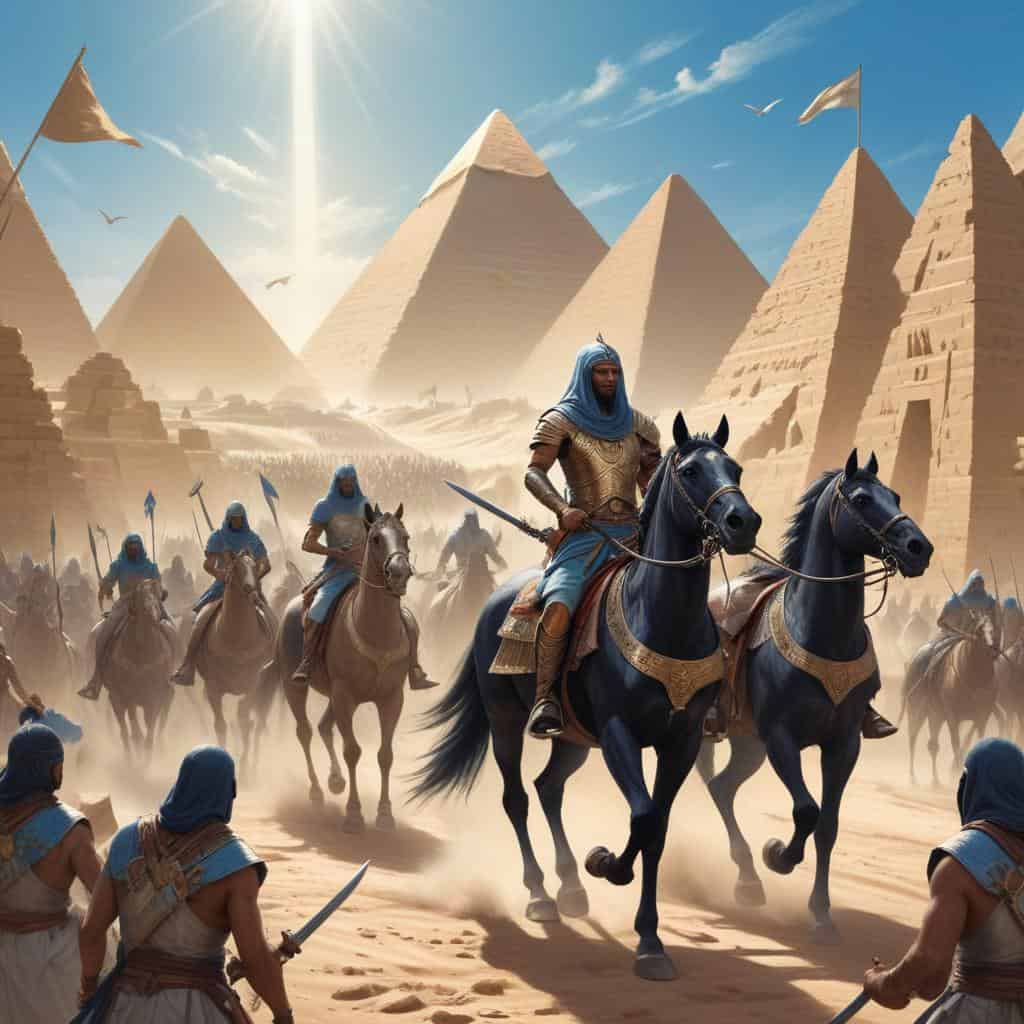The Arab Conquest and Islamic Egypt refer to the period in history when Arab armies conquered Egypt in the 7th century. Islam became the dominant religion and influenced Egyptian culture and society.
This era saw the rise of prominent Islamic dynasties in Egypt, such as the Umayyad and Abbasid caliphates. Islamic architecture and art flourished during this time, leaving a lasting impact on Egyptian heritage.
Summary List
- The Arab Conquest of Egypt occurred in 639-642 AD.
- Islam was introduced to Egypt during the Arab Conquest.
- The Arabs established the Umayyad Caliphate in Egypt.
- Arabic became the official language of administration in Egypt.
- The Arab Conquest had a lasting impact on Egyptian culture, society, and politics.
Games And Apps
Learning Modules
The Battle of Yarmouk (636)
The Battle of Yarmouk in 636 AD was a pivotal clash between the Byzantine Empire and the Muslim forces of the Rashidun Caliphate. This historic battle marked the beginning of the rapid Muslim conquests of the Levant region and solidified Islam's presence in the Middle East.
I Want To Learn This!The Siege of Jerusalem (637)
In 637 AD, the powerful Islamic Caliphate launched a fierce siege on Jerusalem, a city sacred to Christians, Jews, and Muslims. The siege lasted for months, resulting in a bloody battle that changed the course of history. Discover the intense struggle for control in this pivotal moment in the ancient world.
I Want To Learn This!The Conquest of Egypt (641)
The Conquest of Egypt (641) is a gripping historical account of the Arab Islamic conquest of Egypt led by Amr ibn al-As. This pivotal moment in history marked the end of Roman rule in Egypt and the beginning of the Islamic era in the region. Join Amr ibn al-As on his journey to victory.
I Want To Learn This!The Battle of Nahavand (642)
The Battle of Nahavand in 642 was a pivotal conflict in the Muslim conquest of Persia. The victory of the Rashidun Caliphate over the Sassanid Empire marked the end of the ancient Persian dynasty and solidified Islam's dominance in the region. It was a turning point in Middle Eastern history.
I Want To Learn This!The Conquest of Persia (651)
The Conquest of Persia (651) chronicles the rise of the Islamic Caliphate and its conquest of the mighty Persian Empire. Through a series of military campaigns and political maneuvers, the Arab forces led by Caliph Umar ibn al-Khattab successfully subjugated Persia, forever altering the course of history in the region.
I Want To Learn This!The Battle of Talas (751)
The Battle of Talas in 751 CE was a pivotal conflict between the Abbasid Caliphate and the Tang Dynasty, resulting in the spread of papermaking technology from China to the Islamic world. This clash marked a significant turning point in history, shaping the cultural exchange between East and West.
I Want To Learn This!The Abbasid Revolution (750)
The Abbasid Revolution of 750 was a pivotal moment in Islamic history, marking the overthrow of the Umayyad dynasty and the rise of the Abbasid Caliphate. This event reshaped the political landscape of the Muslim world, ushering in a new era of cultural and intellectual flourishing.
I Want To Learn This!The Battle of Tours (732)
The Battle of Tours in 732 was a pivotal moment in European history, where Frankish leader Charles Martel successfully defeated the invading Muslim forces of the Umayyad Caliphate. This decisive battle halted the Muslim advance into Western Europe and solidified the Franks as a dominant power in the region.
I Want To Learn This!The Battle of Heliopolis (640)
In the year 640, the Battle of Heliopolis marked a pivotal moment in history as the Arab forces clashed with the Byzantine Empire in a fierce struggle for control. With the fate of the region hanging in the balance, both sides fought relentlessly in a battle that would change the course of history.
I Want To Learn This!The Battle of Alexandria (641)
The Battle of Alexandria in 641 saw the Arab Muslim forces under Amr ibn al-As defeat the Byzantine Empire, securing Egypt for the rapidly expanding Islamic Caliphate. This pivotal battle marked the beginning of Muslim rule in Egypt and the eventual decline of Byzantine power in the region.
I Want To Learn This!The Battle of Siffin (657)
The Battle of Siffin in 657 was a pivotal moment in early Islamic history, as it marked a conflict between the forces of Ali ibn Abi Talib and Muawiya ibn Abi Sufyan over the leadership of the Muslim community. This battle would have lasting repercussions on the future of Islam and its followers.
I Want To Learn This!The Siege of Constantinople (717-718)
The Siege of Constantinople (717-718) was a pivotal moment in Byzantine history, as the Byzantine Empire successfully defended their capital against a massive Arab invasion. Led by Emperor Leo III, the Byzantines held strong against the siege, ultimately securing their survival and preserving their empire for future generations.
I Want To Learn This!The Battle of Qadisiyyah (636)
The Battle of Qadisiyyah in 636 was a pivotal conflict between the Arab Muslims and the Sassanid Persian Empire. This historic battle ultimately led to the defeat of the Persians and the expansion of the Islamic Caliphate into the Persian territories.
I Want To Learn This!The Battle of Badr (624)
The Battle of Badr was a pivotal moment in Islamic history, where a small army of Muslims led by Prophet Muhammad defeated a much larger army of Quraysh in a surprising and miraculous victory. This battle solidified the early Muslim community and marked the beginning of a new era in Islamic expansion.
I Want To Learn This!The Battle of Karbala (680)
The Battle of Karbala in 680 AD was a pivotal moment in Islamic history, as it marked the martyrdom of Imam Hussein, grandson of Prophet Muhammad. This tragic event solidified the divide between Sunni and Shia Muslims and continues to be commemorated annually in remembrance of the sacrifices made.
I Want To Learn This!The Umayyad Caliphate (661-750)
The Umayyad Caliphate, established in 661, was one of the largest and most powerful Islamic empires in history. Known for its expansion and consolidation of Muslim territories, the Umayyads ruled from their capital in Damascus, spreading Islam and Arab culture across the Middle East and North Africa.
I Want To Learn This!The Fatimid Caliphate (909-1171)
The Fatimid Caliphate, established in 909, was a powerful Islamic empire that ruled over North Africa, the Levant, and parts of Sicily. Known for their promotion of Ismaili Shia Islam, the Fatimids built impressive cities, such as Cairo, and fostered a thriving cultural and intellectual environment during their reign.
I Want To Learn This!The Mamluk Sultanate (1250-1517)
The Mamluk Sultanate, established in 1250, was a powerful Islamic empire that ruled over Egypt and Syria for over two centuries. Known for their military prowess and strategic leadership, the Mamluks faced challenges from Mongol invasions and internal power struggles before ultimately being conquered by the Ottoman Empire in 1517.
I Want To Learn This!The Crusades (1095-1291)
The Crusades were a series of religious wars fought between Christian and Muslim forces in the Middle Ages. Spanning nearly two centuries, these conflicts were marked by intense violence, religious fervor, and a complex interplay of politics and power. The Crusades left a lasting impact on the history of Europe and the Middle East.
I Want To Learn This!The Mongol Invasion of the Abbasid Caliphate (1258)
In 1258, the Mongol Empire, led by Hulagu Khan, launched a brutal invasion of the Abbasid Caliphate, resulting in the sacking of Baghdad and the destruction of the legendary House of Wisdom. This event marked the end of the Islamic Golden Age and forever altered the course of history in the Middle East.
I Want To Learn This!












